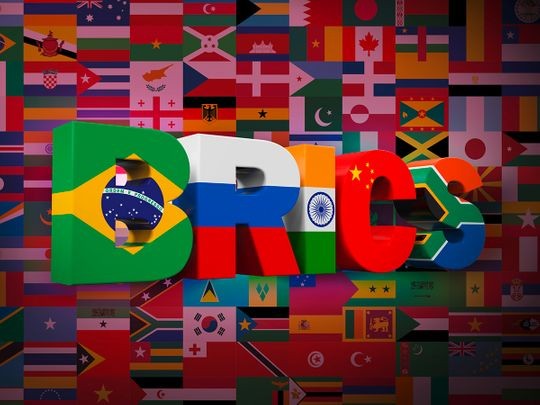 |
| BRICS is rising and could become a potential rival to the G7. (Source: Gulf News) |
On the Gulf News page, author Ramzy Baroud asked: Does anyone think that the Group of the world's leading emerging economies (BRICS) can become a "potential rival" to the Group of the world's leading industrialized countries (G7) ? Currently, there are many factors proving this.
The BRICS group includes five economies: Russia, China, India, Brazil and South Africa.
The first formal BRICS summit took place in 2009. However, it was not until 2014 that BRICS began to move towards deeper integration. The group established the New Development Bank, with an initial capital of $50 billion.
According to author Ramzy Baroud, this decision means that the group is ready to take the first practical steps in challenging the West's dominance of international monetary institutions, namely the World Bank (WB) and the International Monetary Fund (IMF).
BRICS carries greater economic weight than G7
The global geopolitical conflict, stemming from the Russia-Ukraine conflict, has changed the situation.
Financially powerful countries such as Argentina, the United Arab Emirates (UAE) , Mexico, Algeria and especially Saudi Arabia have begun to take an interest in BRICS.
Data compiled by a UK-based macro research firm - Acorn Macro Consulting - shows that the BRICS group of countries carries a larger economic weight than the G7. Specifically, BRICS has the largest gross domestic product (GDP) in the world. The group currently contributes 31.5% to global GDP, far exceeding the G7 with 30.7%.
In addition, according to previous economic forecasts, by 2050, the economies of the BRICS countries are expected to compete strongly with the world's richest countries.
Author Ramzy Baroud observes that one of the biggest opportunities and challenges facing BRICS today is the ability to expand its membership, while maintaining its current growth rate.
"The issue of helping new members maintain economic and political independence is of particular vital importance," Mr. Ramzy Baroud emphasized.
The Role of BRICS in a Changing World
Inflation is hitting many Western countries, leading to slower economic growth and social unrest. Countries in the Southern Hemisphere see this as an opportunity to develop their own alternative economies.
This means that groups like BRICS will no longer be exclusive economic institutions, says author Ramzy Baroud.
On March 30, Brazil and China announced a trade agreement that will allow both sides to use their national currencies for transactions, instead of using the US dollar. Transactions will be processed by the Industrial and Commercial Bank of China (ICBC) and the Brazilian Bank of Communications (BBM).
This move will be consequential, as it will encourage other South American countries to follow suit. But the move by these two countries is not the first, nor will it be the last.
After a meeting on March 30-31 in Indonesia, one of the main decisions of the finance ministers and central bank governors of the Association of Southeast Asian Nations (ASEAN) was to reduce dependence on the US dollar.
These countries agreed to “strengthen financial resilience… through the use of local currencies to support cross-border trade and investment in the ASEAN region.” This is also a “game-changing” tool in a volatile world context.
In particular, author Ramzy Baroud sees the BRICS countries as being set up to play a supporting role in reshaping the world's economic and financial map.
“ The argument that BRICS is a purely economic grouping misses a big part of the story,” he stressed. “The expansion of BRICS shows that the group has become the new foundation of the South in terms of geopolitics, economics and diplomacy.”
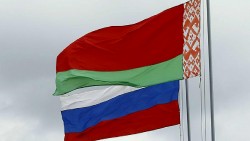 | President Lukashenko: Belarusian and Russian economies will not collapse, despite sanctions On April 6, Russian Prime Minister Mikhail Mishustin assessed that the integration process between Russia and Belarus contributes significantly to efforts to ... |
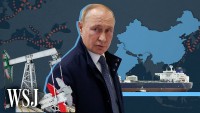 | Russia's 'dodge and block' strategy confronts uncertain series of sanctions from the West Responding to a series of unprecedented and diverse economic sanctions from the US and the West, as an economy ... |
 | Ruble plummets, reason related to oil sanctions? WB lowers Russian economic forecast In trading on April 6 at the Moscow exchange, the USD increased sharply against the Ruble - for the first time rising above the level of ... |
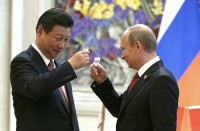 | Russia believes in 'Chinese wind' on economic 'sail', Beijing-Moscow join forces to 'boycott' USD The current geopolitical situation regarding the Russia-Ukraine conflict and the unprecedented sanctions policy against Moscow by ... |
 | On April 10, WSJ announced the results of a global study on the value of natural resources in the world. |
Source


![[Photo] Prime Minister Pham Minh Chinh meets with the Policy Advisory Council on Private Economic Development](https://vphoto.vietnam.vn/thumb/1200x675/vietnam/resource/IMAGE/2025/5/8/387da60b85cc489ab2aed8442fc3b14a)
![[Photo] General Secretary concludes visit to Azerbaijan, departs for visit to Russian Federation](https://vphoto.vietnam.vn/thumb/1200x675/vietnam/resource/IMAGE/2025/5/8/7a135ad280314b66917ad278ce0e26fa)

![[Photo] President Luong Cuong presents the decision to appoint Deputy Head of the Office of the President](https://vphoto.vietnam.vn/thumb/1200x675/vietnam/resource/IMAGE/2025/5/8/501f8ee192f3476ab9f7579c57b423ad)
![[Photo] National Assembly Chairman Tran Thanh Man chairs the meeting of the Subcommittee on Documents of the First National Assembly Party Congress](https://vphoto.vietnam.vn/thumb/1200x675/vietnam/resource/IMAGE/2025/5/8/72b19a73d94a4affab411fd8c87f4f8d)











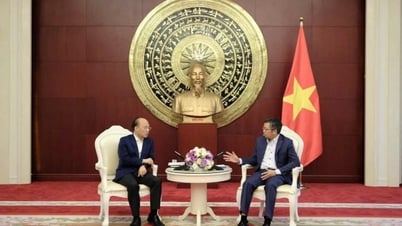



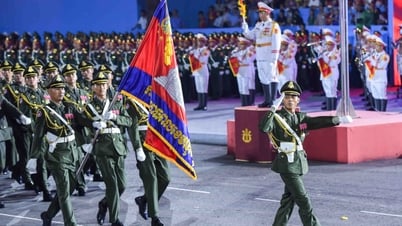

































![[Photo] Prime Minister Pham Minh Chinh talks on the phone with Singaporean Prime Minister Lawrence Wong](https://vphoto.vietnam.vn/thumb/402x226/vietnam/resource/IMAGE/2025/5/8/e2eab082d9bc4fc4a360b28fa0ab94de)


































Comment (0)